We take a closer look at the iconic LeMat revolver, the Confederate hand cannon of the Civil War.
For the first time in a war, ironclad, steam-propelled warships cruised waterways as armies used railroads to mobilize troops, some armed with repeating small arms. The American Civil War was the first modern conflict that saw the technology from the Industrial Revolution converted into efficient tools of war. The Henry Model 1860 repeating rifle is a prime example of a new weapon used against the battle-proven single-shot, muzzleloading rifles that were the backbone weapons of both the Union and Confederate armies.
Revolvers with six fast shots were common during the war and were employed by cavalry and ground troops on both sides. Colt and Remington were the two main manufacturers building popular and reliable revolvers, but there were other revolver designs available as well. One in particular, the LeMat revolver, became a symbol of the Confederate cause.
Confederate General P.G.T. Beauregard from the great state of Louisiana carried a handsomely engraved LeMat revolver, and other famous Confederate officers such as Braxton Bragg and Thomas “Stonewall” Jackson were known for carrying them as well.
The LeMat revolver had a certain panache about it. With sweeping good looks that fit the legendary and colorful personalities making up the Confederate Army’s officer corps, the LeMat had an air of sophistication that set it apart from the other sidearms of its day.
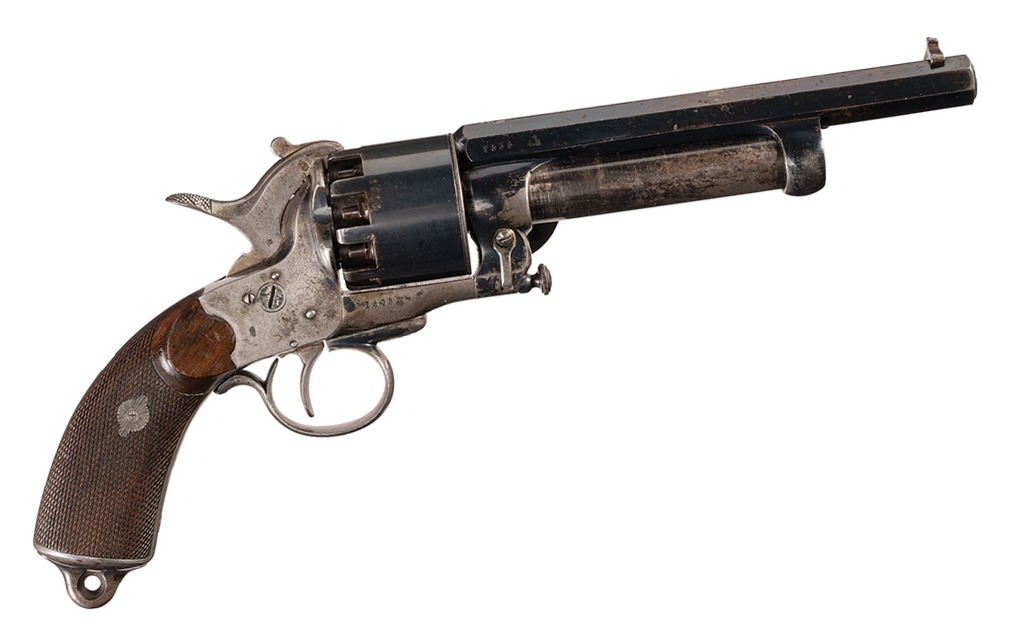
More unusual than it was effective, the double-barrel LeMat revolver offered the user a fistful of firepower. It was a nine-shot black powder percussion revolver combined with a single-shot muzzle-loaded smoothbore shotgun barrel. The LeMat’s shotgun barrel served as the central axis around which the revolver’s nine-shot cylinder rotated.
The LeMat Revolver’s Southern Roots
The LeMat was designed by Frenchman Jean Alexandre LeMat in 1855 and patented in 1856 while he was living in New Orleans. LeMat, like all arms makers, knew that a government contract would be the most lucrative payout for such an unusual revolver. Fortuitously, LeMat’s wife was the cousin of Major P. G. T. Beauregard of the United States Army.
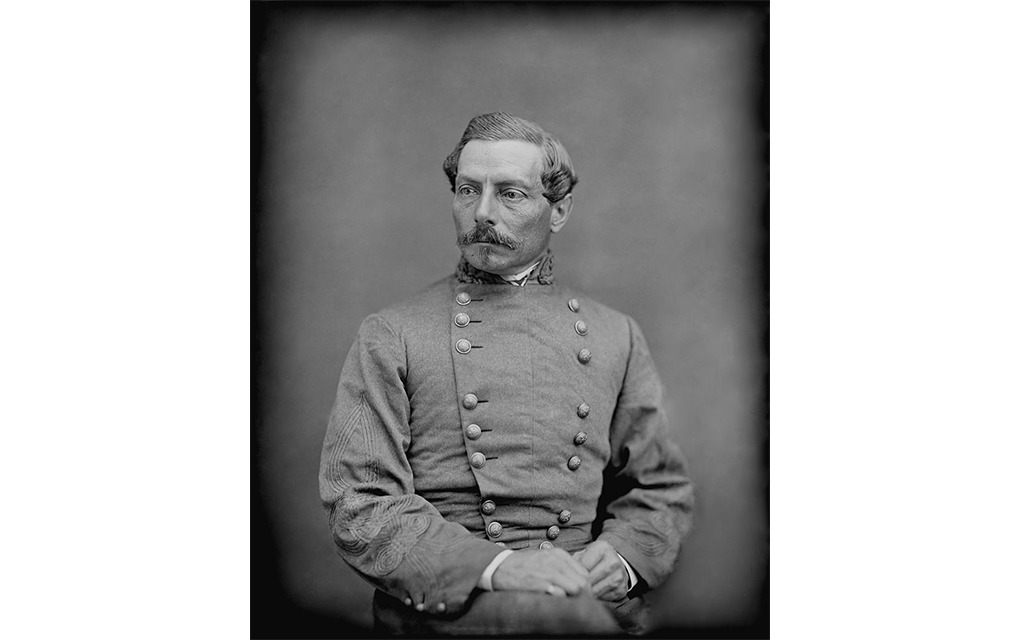

The partnership formed by LeMat and Beauregard was pivotal in the LeMat revolver becoming a symbol of the Confederacy. Beauregard espoused the virtues of the LeMat revolver while he was a U.S. Army Major, but the U.S. Army was not interested and never put the LeMat through test trials.
Following Louisiana’s secession from the Union, Beauregard resigned from the U.S. Army to become a brigadier general in the Confederate States Army. After this, the Confederacy ordered 8,000 LeMat revolvers, but the contract was never entirely fulfilled and it’s estimated only about 2,900 were ever produced. Even fewer of those ever successfully made it into Confederate hands.
LeMat Revolver Design
The LeMat was a fairly complicated revolver to design and build.
The barrel assembly featured a ramrod lever affixed to its side that allowed the user to load the cylinder. Remember that this is a percussion revolver, so it required loose powder and a round ball to be loaded into its chambers and percussion caps placed on the nipples. A removable ramrod for the muzzle-loading shotgun barrel was housed inside the ramrod lever assembly. A small lever built into the hammer nose or face had two positions for the hammer face, and when upright it ignited the percussion cap to fire each of the nine chambers of the cylinder and when rotated down it would fire the lower shotgun barrel.
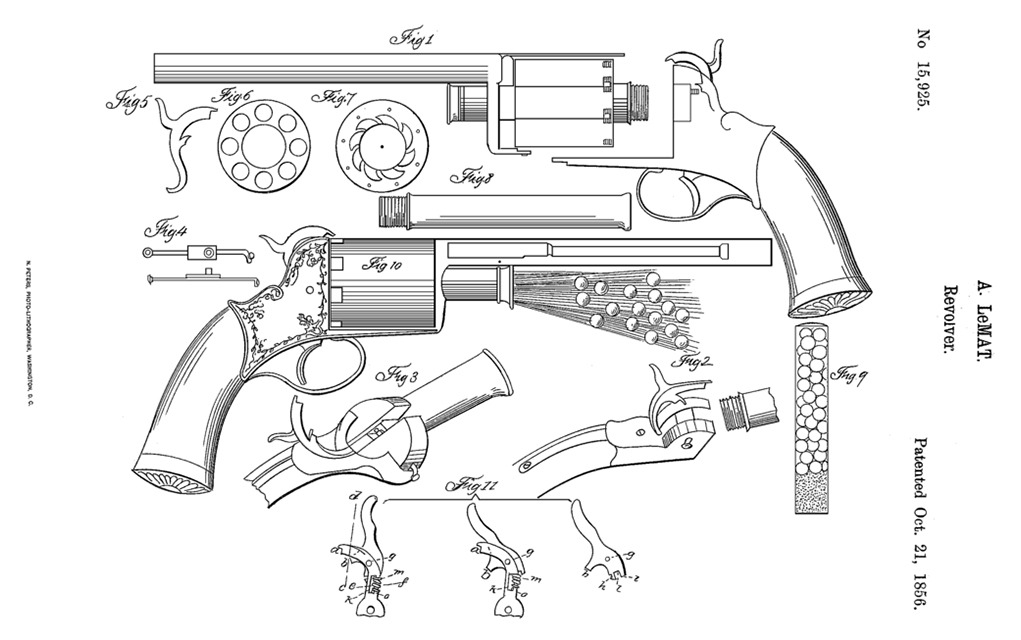

Some later variants of the LeMat were produced in different calibers, but the most common models used .42-caliber projectiles for the revolver portion while the smoothbore shotgun barrel was .63-caliber, roughly equivalent to 18 gauge.
The LeMat was a single-action revolver, meaning the hammer needed to be cocked before each shot. Early LeMat models used a pin as the cylinder stop in conjunction with a hand which aligned a chamber with the barrel. As the hammer is cocked, the pin retracts as the hand rotates the cylinder to align a chamber in the cylinder with the barrel. The pin then springs back to lock the cylinder in place before firing. This complicated system was difficult to manufacture and was prone to jamming after being fouled with black powder residue. This part of the design would eventually be changed, but we’ll discuss that more later.
LeMat Production and Rebel Gunrunners
The first prototypes and early-production guns were made by John Krider in Philadelphia, Pennsylvania. With the Civil War starting and both sides ratcheting up arms production, LeMat knew he wouldn’t be able to have his revolver built Stateside due to the South’s lack of manufacturing infrastructure, so he took his design to Europe to find a firearms manufacturer that could refine the design and produce the revolvers en masse.
The Belgium gunmaker Auguste Francotte produced a prototype LeMat and some of the early production guns, but full production was moved to Charles Frederic Girard and Son of Paris, France. These production guns will have some Belgian-made parts, which the French maker used to build the finished pistols. There were some LeMat revolvers produced in England as well, but none of the British-built revolvers were imported into the States.
The LeMats did, however, take a curious route to Dixieland via England. The revolvers were made in France and then shipped to England where they received British proof marks. From there the LeMats were slipped through Union naval blockages by gunrunners for the Confederates.
LeMat First and Second Pattern Guns
There are two major variants of the standard LeMat revolver, a First Model or First Pattern and a Second Model or Second Pattern.
The First Model guns have a characteristic trigger guard spur, swiveling lanyard loop, a spring-loaded disassembly lever and a pin system to lock the cylinder in place. Complaints from the field with the First Pattern began to trickle in and were mainly due to manufacturing quality control issues and the pin lockup mechanism. It was a difficult revolver to manufacture.
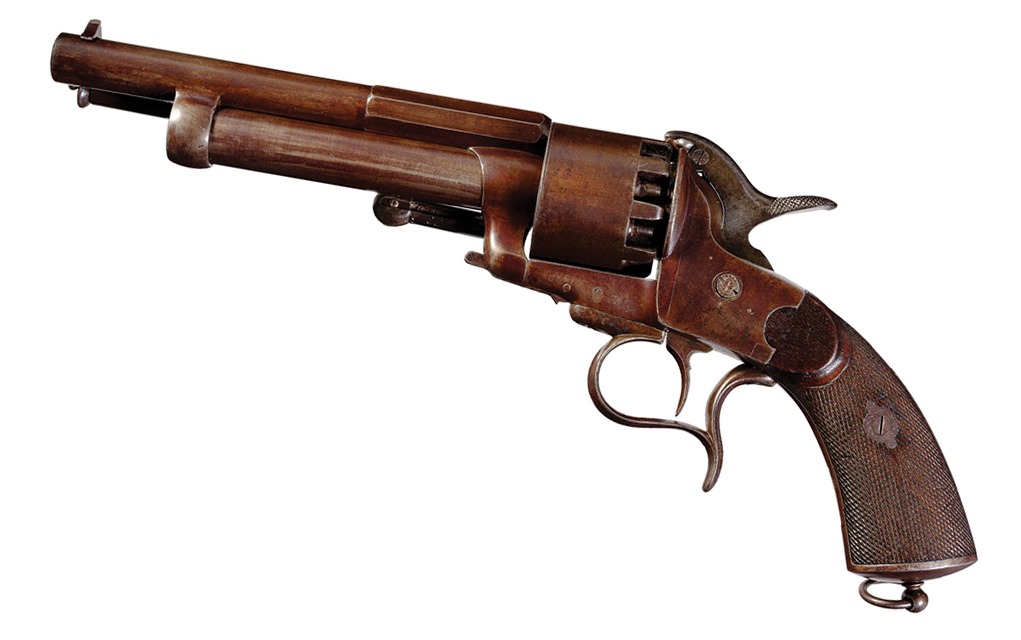

The Second Model guns show engineering changes that helped ease production time and cost as well as improve reliability. The major differences are the trigger guard does not have a spur, the lanyard loop is fixed, a lever was built into the hammer to more easily rotate the hammer face to its shotgun position, a disassembly plunger pin replaced the takedown latch, and the pin lockup was changed to a simpler wedge solution. The wedge worked similarly to the pin but was simpler to manufacture and more reliable when faced with fouling. Not all of these changes happened at once, so some Second Pattern LeMats still feature the older pin lockup system.
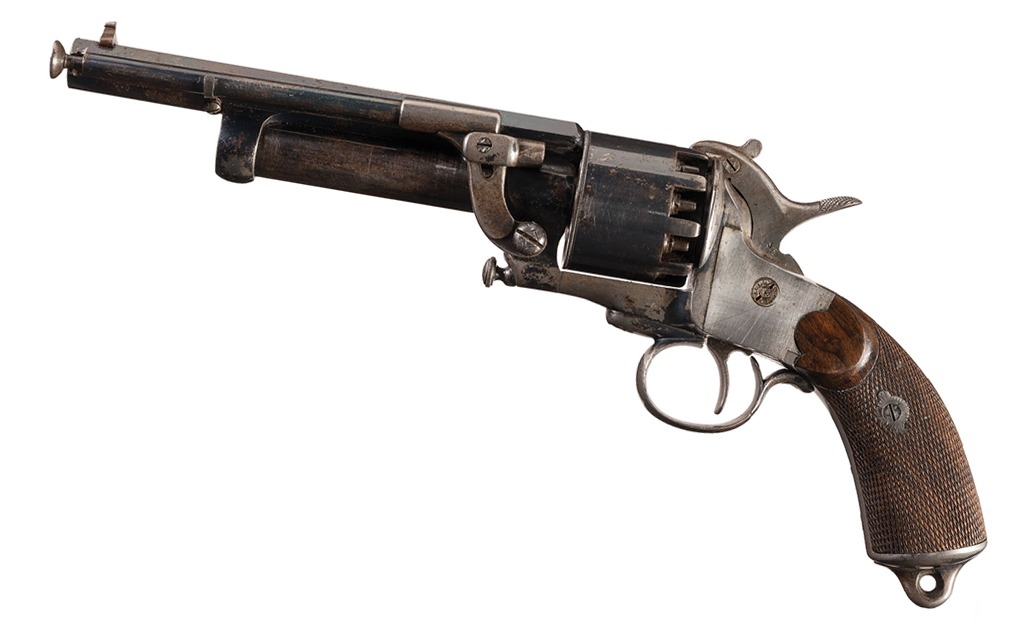

Perhaps the most distinctive change between the First Model and Second Model is the ramrod assembly which was moved to the left side of the barrel and redesigned to pivot upward rather than downward.
Baby LeMat For The Confederate Navy
A smaller variant of the .42-caliber LeMat was a .32-caliber version developed for the Confederate Navy, commonly referred to as the Baby LeMat. Besides now being in .32-caliber (for the revolver portion), the shotgun portion was also reduced in size to .41-caliber and the barrel length and overall dimensions were shrunken as well. That said, it still had a capacity of 9 bullets in the cylinder plus the one shotgun load in its center barrel. The Confederacy ordered 2,000 Baby LeMats in 1864, but when all was said and done only about 100 were produced and delivered due to production and financial issues. This makes them extremely rare today.
LeMat Revolver In Service
The standard LeMat revolver weighed just over four pounds when loaded and was massive with an almost 7-inch barrel. It featured a blued finish and checkered walnut grips. It used a fixed front post sight and a notch in the hammer as the rear sight, similar to a Colt-style revolver of the day.
The LeMat was not known for having good accuracy, but it made up for it in firepower with its 10-shot capacity. General Beauregard, being LeMat’s partner, is quoted as recommending the revolver for “cavalry acting against Indians or when charging on a square of infantry” when promoting the revolver with U.S. Army brass. As fate would have it, the LeMat found a willing buyer in the Confederacy instead, but some soldiers who used them complained about the gun’s excessive recoil and complicated nature.
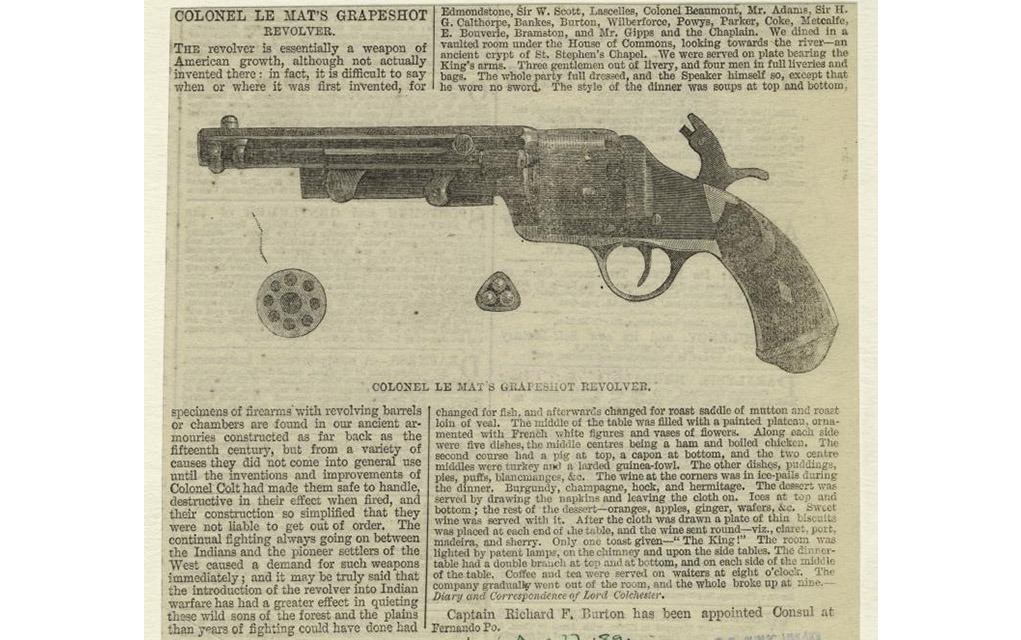

During the Civil War, the Confederacy had a shortage of small arms and was buying just about everything they could get their hands on. The LeMat was certainly better than nothing, and it even had some potential advantages over other available handgun options, but in retrospect, it seems that the revolver just wasn’t as useful as its reputation suggests. The gun’s legendary status today comes more from its unique design and its use by interesting historical characters than it does from its practicality as a fighting weapon.
Another issue with the LeMat was its non-standard caliber of .42. Most military revolvers of the day were either .44 or .36 caliber, so LeMat users were forced to produce their own bullets for them. A very small number of LeMats were made in .36 and .44 at the tail-end of the war to address this, but few saw any actual service.
As an aside, the development of the LeMat system continued to some degree during and after the war and resulted in a few other variants being produced. This includes a pinfire model as well as a later centerfire variant that was produced as both a handgun and a carbine.
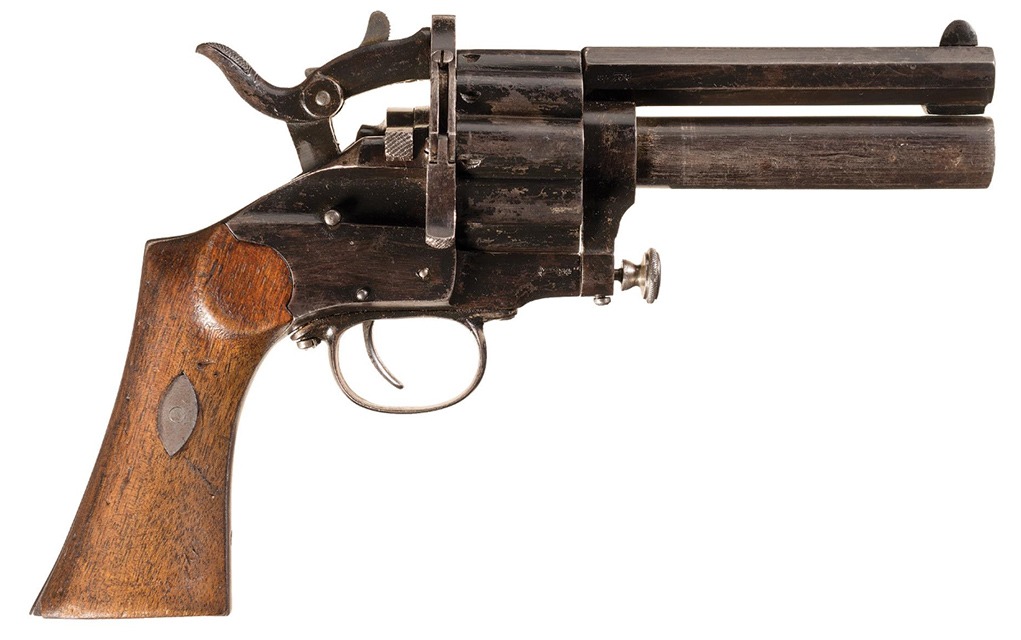

LeMat Legacy
One might suspect that the legacy of the LeMat revolver would have ended with the connection to the Confederate officers who carried them, but it has not. The iconic LeMat has endured thanks to movies, shows and video games.
A LeMat just made an appearance in the recent film Furiosa: A Mad Max Saga, although a non-firing replica was used for filming. A heavily modified version was also wielded by Ed Harris’s character in the TV series Westworld, and an impressively detailed rendition of it is usable in the video game Red Dead Redemption II, as well.


Collecting LeMat Revolvers
As with any firearm that holds a fascination with collectors and has low production numbers, LeMat revolvers carry a very high price tag today. Even in rough condition, original Civil War-era guns can easily go for $10,000 or more. If it’s a rarer variant or one with its provenance tied to a famous Confederate general, the price can skyrocket well beyond that.
An early serial number model in very good condition even sold for about $53,000 in 2023. The LeMat carried by “Stonewall” Jackson has never been found, but that would certainly be a very valuable gun if it were ever located and brought to auction.
This means that owning an original LeMat is off the table for everyone except the most serious and wealthy collectors, but thankfully, reproductions from Pietta are available for the rest of us. That said, the repros aren’t cheap either, as MSRPs are around $1,500. Expensive, but far less than you could get any original for, and at least you can shoot these without worrying about damaging a relic.
While Pietta makes great guns, their LeMats are such an accurate copy of the original design that they share some of the same flaws, namely fragility. If you buy one of these to shoot, just keep in mind that it will need to be treated more delicately than other reproduction guns of this era if you don’t want to break it.
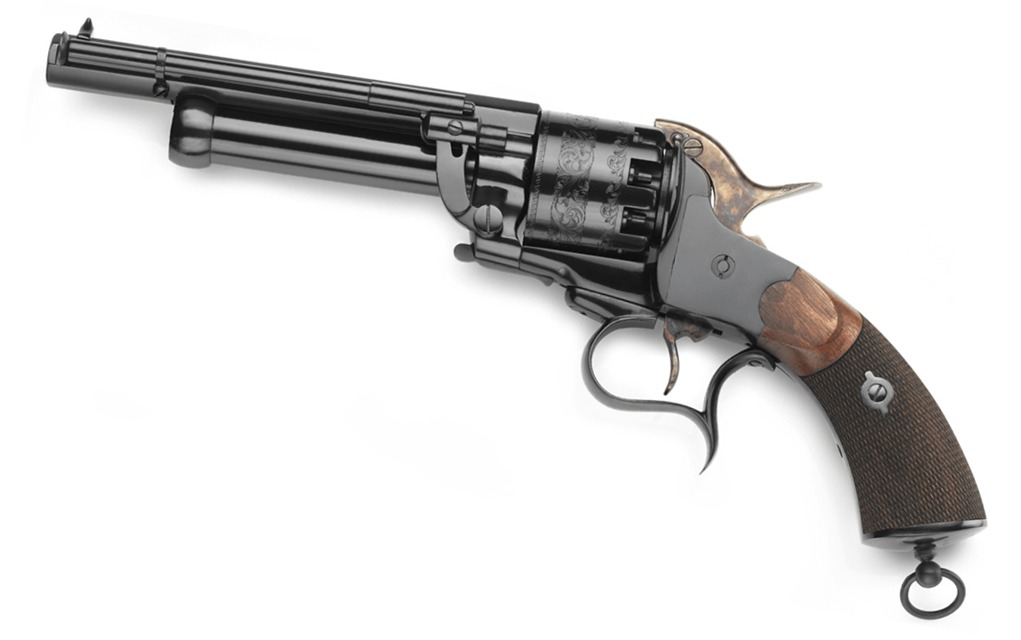

The LeMat is a very unique gun, and it deserves to be remembered for its role in America’s history if for no other reason than the prominence of some of the men who carried it during such a pivotal period. Even ignoring that, one can’t deny that a revolver with a built-in shotgun is just pretty damn cool.
More Classic Old West Guns:


Next Step: Get your FREE Printable Target Pack
Enhance your shooting precision with our 62 MOA Targets, perfect for rifles and handguns. Crafted in collaboration with Storm Tactical for accuracy and versatility.
Subscribe to the Gun Digest email newsletter and get your downloadable target pack sent straight to your inbox. Stay updated with the latest firearms info in the industry.
Read the full article here

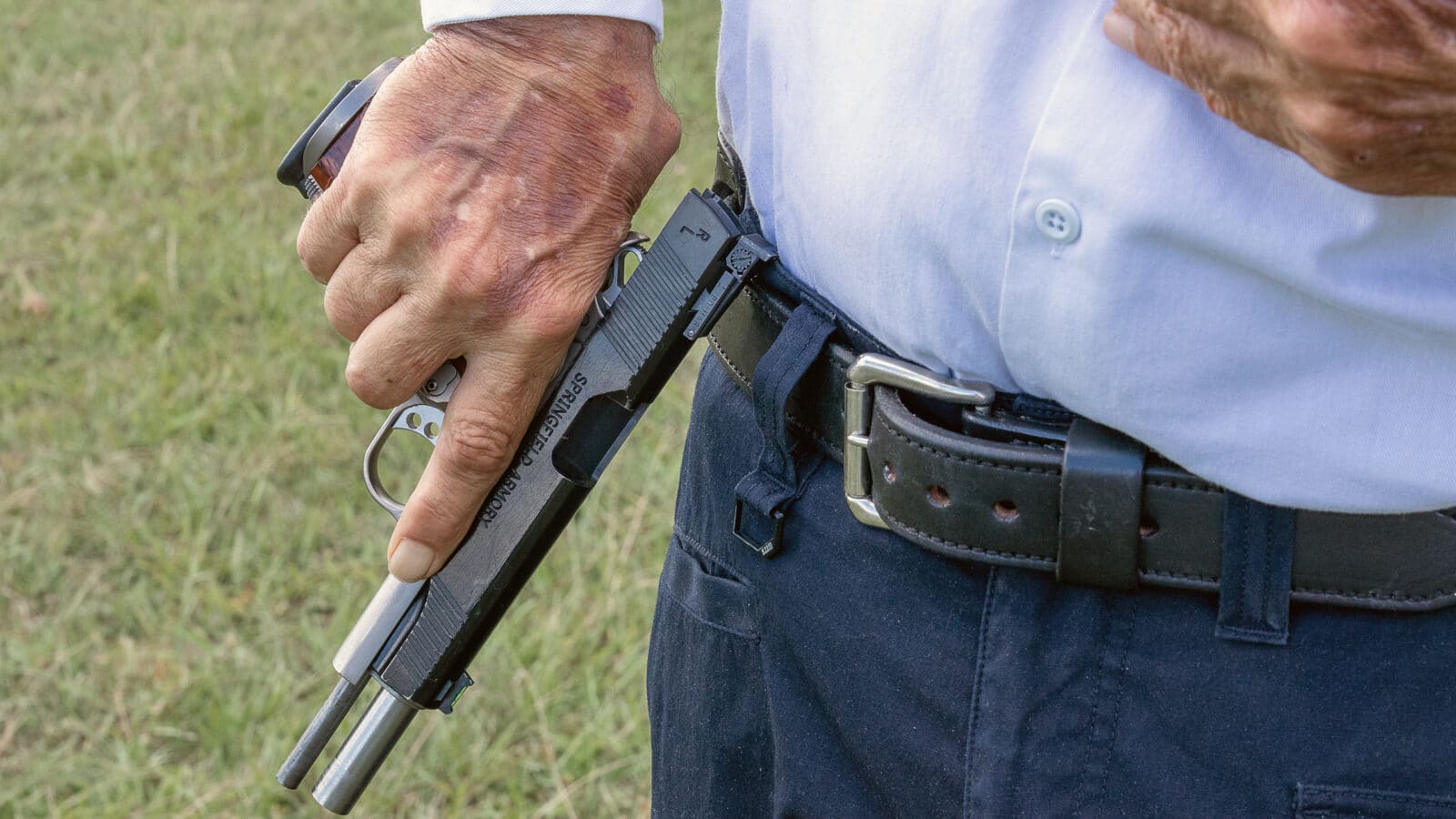














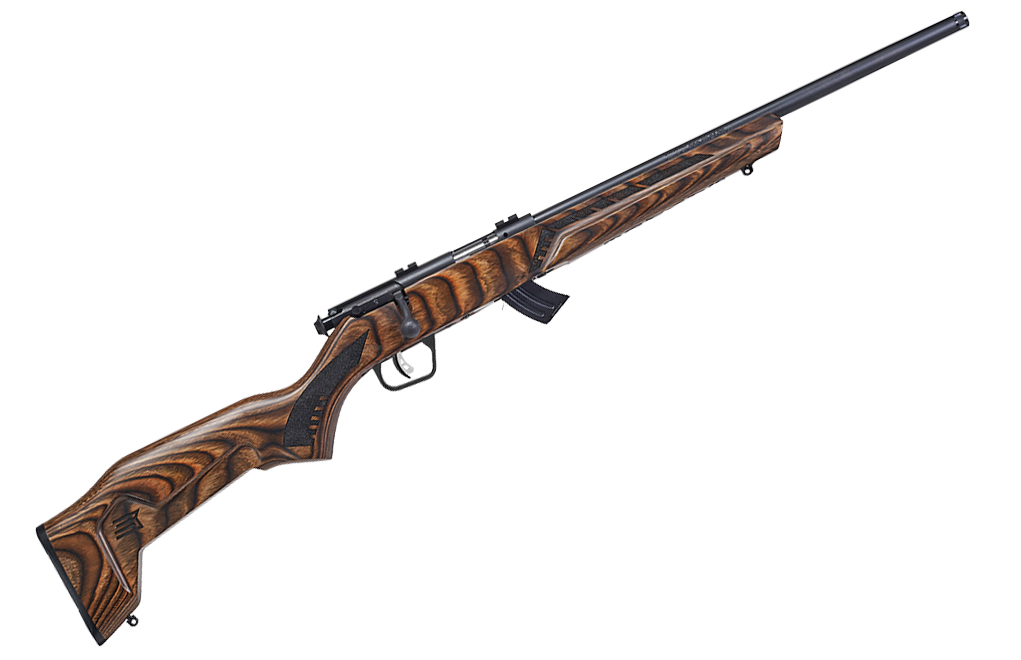

Leave a Reply